It's related to this:
Canada sanctions Chinese officials for human rights violations -- (Dec 10, 2024)
[...] Mélanie Joly, Minister of Foreign Affairs, today announced sanctions under the Special Economic Measures (People’s Republic of China) Regulations against 8 former or current senior officials involved in grave human rights violations in the country.
The sanctions announced today respond to Chinese government-led repression of ethnic and religious minorities in China, including in Xinjiang, Tibet and against those who practise Falun Gong.
[...] Canada is deeply concerned over reports that China has arbitrarily detained more than one million people in Xinjiang since 2017, many of whom were held in camps and faced psychological, physical and sexual violence.
Tibetans have also endured human rights violations at the hands of the Chinese government. This includes forced labour, arbitrary detention and restrictions on their rights to freedom of religion or belief, expression, movement and association.
[...]
Quick facts
-
In July 2024, Minister Joly visited China and met with Minister Wang Yi to discuss Canada-China relations, human rights and complex global and regional security issues.
-
In September 2021, Canada announced new measures to address human rights abuses in Xinjiang, China. These measures addressed the risk of goods produced from forced labour from entering Canadian and global supply chains.
-
In March 2021, Canada enacted the Special Economic Measures (People’s Republic of China) Regulations and imposed sanctions against Chinese officials and a Chinese entity in response to gross and systematic human rights violations that have been committed in China.
China said on Sunday it was taking countermeasures against two Canadian institutions and 20 people involved in human rights issues concerning the Uyghurs and Tibet.
The measures, which took effect on Saturday, include asset freezes and bans on entry and the targets include Canada's Uyghur Rights Advocacy Project and the Canada-Tibet Committee, China's foreign ministry announces on its website.
Rights groups accuse Beijing of widespread abuses of Uyghurs, a mainly Muslim ethnic minority that numbers around 10 million in the western region of Xinjiang, including the mass use of forced labour in camps. Beijing denies any abuses.
China seized control of Tibet in 1950 in what it describes as a "peaceful liberation" from feudalistic serfdom. International human rights groups and exiles, however, have routinely condemned what they call China's oppressive rule in Tibetan areas.
Democracies must challenge Beijing’s threats to the UN human rights system and its standards, as they are starting to do on Taiwan.
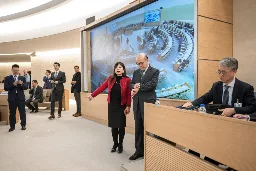
cross-posted from: https://beehaw.org/post/17728055
> The Czech Parliament’s Foreign Affairs Committee adopted a resolution last week condemning the Chinese government’s manipulation of a key United Nations resolution on Taiwan. Similar initiatives in the parliaments of Australia, The Netherlands, the European Union, Canada, and the United Kingdom over the previous months called out Beijing’s longstanding campaign to block Taiwan’s democratic government from participating in U.N. activities. Governments willing to tackle this challenge also should confront Beijing’s strikingly similar threat to the U.N. human rights system. > > At a time of global backsliding on democracy and human rights, these efforts may seem niche or Quixotic. But democracies defending one another, particularly through their own domestic institutions and not only as a matter of foreign policy, demonstrates a principled commitment. Few issues matter more to Chinese Communist Party General Secretary Xi Jinping than retaking control of Taiwan, and his regime has lashed out at other governments taking milder positions on the issue. But these six democracies have recognized that Xi’s posture threatens them and the U.N., one of the key international institutions on which they rely, creating considerable diplomatic momentum for a position that was unimaginable at the beginning of 2024. > > The parliamentary efforts are informed by groundbreaking report earlier this year by scholars Bonnie S. Glaser and Jacques deLisle for the German Marshall Fund of the United States, “Exposing the PRC’s Distortion of UN General Assembly Resolution 2758 to Press its Claims Over Taiwan.” It details Beijing’s decades-long efforts to launder its claims of sovereignty through the United Nations. > > But the political pathologies detailed — and the recommendations offered — could equally apply to Beijing’s efforts to undermine human rights at the world’s flagship body. The similarities cannot be an accident: “flawed legal assumptions” (as Glaser and deLisle put it), decades of pressure, diplomatic capitulations, and weak responses from democracies neatly summarize how Xi seeks to neutralize U.N. human rights initiatives. > > [...]
Democracies must challenge Beijing’s threats to the UN human rights system and its standards, as they are starting to do on Taiwan.
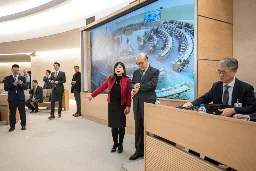
The Czech Parliament’s Foreign Affairs Committee adopted a resolution last week condemning the Chinese government’s manipulation of a key United Nations resolution on Taiwan. Similar initiatives in the parliaments of Australia, The Netherlands, the European Union, Canada, and the United Kingdom over the previous months called out Beijing’s longstanding campaign to block Taiwan’s democratic government from participating in U.N. activities. Governments willing to tackle this challenge also should confront Beijing’s strikingly similar threat to the U.N. human rights system.
At a time of global backsliding on democracy and human rights, these efforts may seem niche or Quixotic. But democracies defending one another, particularly through their own domestic institutions and not only as a matter of foreign policy, demonstrates a principled commitment. Few issues matter more to Chinese Communist Party General Secretary Xi Jinping than retaking control of Taiwan, and his regime has lashed out at other governments taking milder positions on the issue. But these six democracies have recognized that Xi’s posture threatens them and the U.N., one of the key international institutions on which they rely, creating considerable diplomatic momentum for a position that was unimaginable at the beginning of 2024.
The parliamentary efforts are informed by groundbreaking report earlier this year by scholars Bonnie S. Glaser and Jacques deLisle for the German Marshall Fund of the United States, “Exposing the PRC’s Distortion of UN General Assembly Resolution 2758 to Press its Claims Over Taiwan.” It details Beijing’s decades-long efforts to launder its claims of sovereignty through the United Nations.
But the political pathologies detailed — and the recommendations offered — could equally apply to Beijing’s efforts to undermine human rights at the world’s flagship body. The similarities cannot be an accident: “flawed legal assumptions” (as Glaser and deLisle put it), decades of pressure, diplomatic capitulations, and weak responses from democracies neatly summarize how Xi seeks to neutralize U.N. human rights initiatives.
[...]
This is an opinionated article by Prof. (Emeritus) Yoel Elizur, The Seymour Fox School of Education, The Hebrew University of Jerusalem. Chairperson of the Council of Psychologists (2010-13). As a mental health officer in reserve, he was the chief supervisor of the IDF's RRC, the Israeli Defense Force's Rear Rehabilitation Centers .
The article was published in Haaretz, an Israeli newspaper commonly known as criticial of Netanyahu's government.
[...]
Moral injury occurs when soldiers act against their moral values and beliefs or participate as bystanders. Those injured in this way experience guilt and shame, and are prone to depression, anxiety and suicidal impulses. The IDF provides month-long intensive treatment to traumatized soldiers, some of whom have been morally injured, in Rear Rehabilitation Centers (RRCs). Subsequently, half of these soldiers are discharged as unfit for military duty.
[...]
The discussion of atrocities evokes emotional resistance even though it is intellectually understood that crimes exist in every civilized society and that war crimes have been committed by soldiers in every army. Developmental psychologists have identified callous traits in young children while social psychologists have demonstrated that authoritative directives and social pressure lead ordinary people to harmful behavior.
Still, it is difficult to face the violence of callous soldiers and the brutalization of ordinary soldiers. Therefore, I am not reassured when my grandson says: "Don't worry, Grandpa, I will refuse an illegal order."
I want to protect him and all others who are risking their body and mind when they serve in the IDF. I want them to know how difficult it is to stand up to a callous commander and to resist peer pressure encouraging brutality. I want them to know about the slippery slope of brutalization and get educated about the moral dilemmas they will face during wartime. This motivated me to write this essay both as a grandfather and as a psychologist who has researched soldiers' experience with brutalization.
[...]
We [fellow researcher Nuphar Ishay-Krien and the author] identified five groups of soldiers based on personality traits.
[...]
1. A small Callous group was composed of ruthless soldiers, some of whom confessed to violence before the draft. These soldiers committed most of the severe atrocities. The power they received in the army was intoxicating:
>"It's like a drug ... you feel like you are the law, you make the rules. As if from the moment you leave the place called Israel and enter the Gaza Strip, you are God."
They viewed brutality as an expression of strength and masculinity.
>"I have no problem with women. One threw a slipper at me, so I gave her a kick here (pointing to the groin), broke all this here. She can't have children today."
>"X shot an Arab four times in the back and got away with a self-defense claim. Four bullets in the back from a distance of ten meters ... cold-blooded murder. We did things like that every day."
[...]
2. A small, ideologically violent group supported the brutality without taking part. They believed in Jewish supremacy and were derogatory toward Arabs. Moral injuries were not reported in this group.
[...]
3. A small incorruptible group opposed the influence of the callous and ideological groups on the company's culture. Initially intimidated by brutal commanders, they later* took a moral stand and went on to report the atrocities* to the division commander. Following discharge, most of them viewed their service as meaningful and strengthening. However, one whistle blower [...] was traumatized, depressed and left the country following discharge.
[...]
4. A large group of followers consisted of soldiers with no prior inclination to violence. Their behavior was most influenced by junior officers' modeling and the company's norms. Some followers who committed atrocities reported moral injuries:
>"I felt like, like, like a Nazi ... it looked exactly like we were actually the Nazis and they were the Jews."
[...]
5. The restrained was a large group of inner-directed soldiers who maintained military standards and did not commit atrocities. They responded to Palestinian violence and life-threatening situations in balanced and legally justified ways.
[...]
In each of the companies, an internal culture developed that was largely shaped by junior commanders and charismatic soldiers. Initially, the norms instigated atrocities.
>"A new commander came to us. We went out with him on the first patrol at six in the morning. He stops. There's not a soul in the streets, just a little 4-year-old boy playing in the sand in his yard. The commander suddenly starts running, grabs the boy, and breaks his arm at the elbow and his leg here. Stepped on his stomach three times and left. We all stood there with our mouths open. Looking at him in shock ... I asked the commander: "What's your story?" He told me: These kids need to be killed from the day they are born. When a commander does that, it becomes legit."
[...]
There is much evidence of alleged war crimes in the current war and it is easily accessible. Lee Mordechai, an Israeli historian, has been collecting, categorizing, and regularly updating the data. The data include reports by reputable institutions such as the United Nations, reporting by mainstream media outlets, and images, and videos uploaded to social media.
[...]
As the corrupting influence of the Callous and Ideologically Violent soldiers increases, the Incorruptible are marginalized. Max Kresh, a reserve fighter, declared his opposition to participating in crimes against humanity like "flattening Gaza." The result was severe social ostracism: "They kicked me out of my team. They made it clear they didn't want me." He returned from reserve duty feeling "mentally crushed."
[...]
Sde Teiman, a detention facility [where Palestinians are detained], is like a microcosm of brutalization in the current war. It became notorious when an Incorruptible veteran physician reported signs of severe sexual abuse in a detainee. Nine IDF reserve soldiers were subsequently detained on suspicion of aggravated sodomy and other forms of abuse.
[...]
A Restrained student in the reserves described brutalization [in Sde Teiman] and its effect on the Followers.
>"I saw sadistic people there. People who enjoy causing suffering to others. … What was most disturbing was to see how easily and quickly ordinary people can detach themselves and not see the reality right in front of their eyes when they are in a difficult and shocking human situation."
Similarly, a reservist doctor stated:
>"There is total dehumanization here. You don't really treat them as if they are human beings ... in retrospect, the hardest thing for me is what I felt, or actually what I didn't feel when I was there. It bothers me that it didn't bother me. There is normalization of the process, and at some point, it just stops bothering."
A Restrained female reservist kept her standards by escaping the facility:
>"The dehumanization scared me. The encounter with such dangerous attitudes, which has become more normal in our society, was traumatic for me ... I discharged myself from reserve duty with a psychiatrist's help."
[...]
The author Prof. (Emeritus) Yoel Elizur concludes:
>In this context, our government's rhetoric of hatred and revenge, which has been reinforced by its determined undermining of the justice system, led to excessive retaliation and mass killing of civilians in Gaza. It provided a tailwind for atrocities by Callous and Ideologically Violent soldiers, increased their influence over the Followers, and sidelined the Incorruptible.
>[...] the senior command is responsible for upholding the values listed in the IDF's code of ethics, including purity of arms and discipline, which dictate: "IDF soldiers will not use their weapon or power to harm uninvolved civilians and prisoners" and "The soldier will ensure they are only giving out legal orders, and do not follow illegal orders." By upholding these values, they can prevent brutalization against the innocent and protect the soul of our soldiers.
>We, the citizens who send our children, spouses and grandchildren to military service, must find ways of resistance. We are obligated to speak clearly in order to keep limits on the cruelty of war, to uphold our moral code, and to protect soldiers from moral injury and its long-term consequences.
The buzzword – which went viral after a student was filmed working on his laptop while riding his bicycle – reflects a mix of competitiveness and hopelessness amid China’s slowing economy
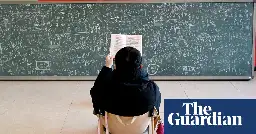
Neijuan is the Chinese term for “involution”, a concept from sociology that refers to a society that can no longer evolve, no matter how hard it tries. Applied to the individual, it means that no matter how hard someone works, progress is impossible.
In China, the term has been used to describe the feeling of diminishing returns in China’s economy. The characters “nei” and “juan” literally mean rolling inwards. After decades of rapid growth, many Chinese millennials and Gen Z people feel that the opportunities that were available to their parents no longer exist, and that working hard no longer offers guaranteed rewards.
[...]
China’s leaders have made it clear that they don’t want the idea of neijuan to catch on more than it already has. In December, top economic policymakers gathered for the annual Central Economic Work Conference, which sets the national economic agenda. According to the readout of the closed-door meeting, the cadres pledged to “rectify ‘involutionary’ competition”. And speaking at Davos in June, China’s premier, Li Qiang, warned against “spiralling ‘involution’” in the world economy.
[...]
Neijuan is also increasingly used to describe certain industries. China is investing massively in what it calls “new quality productive forces”, which means focusing more on research and manufacturing in certain hi-tech sectors, such as solar, electric vehicles and batteries. But overproduction, coupled with sanctions from the US and other western markets, has led to a price war in some sectors, hurting their profitability.
[...]
Although the term has been around for decades in academic circles, it went viral on China’s internet in 2020. A student from Tsinghua University, one of China’s most elite schools, was filmed riding his bicycle with his laptop open, propped up on the handlebars. Soon he was crowned as “Tsinghua’s involuted king”, and a meme was born.
The meme of the involuted king came to represent the perhaps pointlessly intense pressure of China’s rat race, and the impossibility of catching a break. During the Covid-19 pandemic, many people felt physically as well as economically trapped.
[...]
A new and high-stakes escape route has been revealed, through the Indonesian archipelago to a smuggler’s boat

cross-posted from: https://beehaw.org/post/17727229
> A growing number of Chinese are fleeing their home country, where rising authoritarianism under the rule of Xi Jinping and the difficulties of a faltering economy has prompted some people to look for a way out. The phenomenon has become so widely discussed online that it has its own nickname: runxue, or run philosophy, a coded term for emigration. > > Some are relocating on student or business visas, joining growing diaspora communities in places like Japan or Thailand. But tens of thousands of others who don’t qualify or have the resources for such pathways are fleeing in other unconventional and often dangerous ways, known as zouxian, or walking the line. > > Most head for the US, trekking from South America through the hostile jungle of the Darian Gap. In September the Guardian revealed a small but growing number were also flying into the Balkans to find smugglers to take them to Germany. Now, another emerging high-stakes escape route has been revealed, through the Indonesian archipelago to a smuggler’s boat destined for Australia. > > [...] > > Experts say the arrival of Chinese people on this route signals growing discontent at home. > > Some Chinese migrants in the US and Europe have said tightening restrictions on political, religious and social freedoms during Xi’s rule led them to flee. Others cited stifling public health policies during the pandemic, and the economic downturn, housing crunch, and youth unemployment crisis that followed. > > Meredith Oyen, an associate professor at the University of Maryland at Baltimore County, specialising in Chinese migration, says politics and economics are push factors. > > “The zero-Covid policy ended up destroying a lot of small businesses and a lot of middle class people’s economic life … The combination of that and the draconian nature of some of those policies led to frustrations and more political dissatisfactions. > > “Even if you’re not driven by political repression, the experience of bankruptcy in China is political, it has more blowback on your life compared to places like the US. So it feels like if you’re just going to be languishing in China and you don’t see hope for recovery in a way that makes you a welcome member of society, you might as well risk it.” > > [...] > > China does not release statistics on people leaving, but the UN’s refugee agency – which has registered around a third of all displaced people and refugees – recorded 137,143 asylum seekers from China in 2023, five times the number registered a decade earlier at the start of Xi’s rule. By July this year it had grown to 176,239. > > [...] > > Last week, a Chinese resident commented on a Douyin video about zouxian [a term used in mainland China usually for Chinese trying to escape to the U.S. via the -dangerous- Darien Gap in Latin America] to Australia. “I’m at the end of the road. I can’t survive any more. I want to go. I want to go very much,” he said. > > [...]
A new and high-stakes escape route has been revealed, through the Indonesian archipelago to a smuggler’s boat

cross-posted from: https://beehaw.org/post/17727229
> A growing number of Chinese are fleeing their home country, where rising authoritarianism under the rule of Xi Jinping and the difficulties of a faltering economy has prompted some people to look for a way out. The phenomenon has become so widely discussed online that it has its own nickname: runxue, or run philosophy, a coded term for emigration. > > Some are relocating on student or business visas, joining growing diaspora communities in places like Japan or Thailand. But tens of thousands of others who don’t qualify or have the resources for such pathways are fleeing in other unconventional and often dangerous ways, known as zouxian, or walking the line. > > Most head for the US, trekking from South America through the hostile jungle of the Darian Gap. In September the Guardian revealed a small but growing number were also flying into the Balkans to find smugglers to take them to Germany. Now, another emerging high-stakes escape route has been revealed, through the Indonesian archipelago to a smuggler’s boat destined for Australia. > > [...] > > Experts say the arrival of Chinese people on this route signals growing discontent at home. > > Some Chinese migrants in the US and Europe have said tightening restrictions on political, religious and social freedoms during Xi’s rule led them to flee. Others cited stifling public health policies during the pandemic, and the economic downturn, housing crunch, and youth unemployment crisis that followed. > > Meredith Oyen, an associate professor at the University of Maryland at Baltimore County, specialising in Chinese migration, says politics and economics are push factors. > > “The zero-Covid policy ended up destroying a lot of small businesses and a lot of middle class people’s economic life … The combination of that and the draconian nature of some of those policies led to frustrations and more political dissatisfactions. > > “Even if you’re not driven by political repression, the experience of bankruptcy in China is political, it has more blowback on your life compared to places like the US. So it feels like if you’re just going to be languishing in China and you don’t see hope for recovery in a way that makes you a welcome member of society, you might as well risk it.” > > [...] > > China does not release statistics on people leaving, but the UN’s refugee agency – which has registered around a third of all displaced people and refugees – recorded 137,143 asylum seekers from China in 2023, five times the number registered a decade earlier at the start of Xi’s rule. By July this year it had grown to 176,239. > > [...] > > Last week, a Chinese resident commented on a Douyin video about zouxian [a term used in mainland China usually for Chinese trying to escape to the U.S. via the -dangerous- Darien Gap in Latin America] to Australia. “I’m at the end of the road. I can’t survive any more. I want to go. I want to go very much,” he said. > > [...]
Yeah, but that appears to be two sides of one coin. A year ago, a researcher from Hong Kong argued in a book that a rise in the number of autocracies "expand Chinese global influence via Belt and Road." From the excerpt of this book:
When rulers in autocracies with semi-competitive elections [...] have a weak hold on power, their desire for Chinese spending is amplified. This relates to clientelism, or the delivery of goods and services in exchange for political support.
A higher level of state control in autocracies grants political leaders greater influence over the allocation of clientelist benefits, which aids leaders’ reelection efforts.
That's maybe a good example that democracy -not 'the West'- is China's real and only enemy.
Die sind schon weg, wenn ich das richtig verstanden habe.
The linked post in my comment says, among others:
-
All 9 Austrian teenagers between 14 and 17 years of age see radical right-wing propaganda, “free home delivered from China,” as the magazine writes.
-
The young people see Herbert Kickl, the current leader of the far-right Austrian Freedom Party, the avatar of Jörg Haider, a former right-wing politician who died in a car accident in 2008, and Alice Weidel, the head of the far-right AfD (Alternative for Germany - Alternative for Germany).
-
Russian propaganda arises, too, promoting immigration to Russia: “We offer work, a house, a Russian wife and military training,” promises a mock Vladimir Putin to a 15-year-old teenager from Styria, one of Austria’s nine states. Teenagers must apply only at “einbürgerung@kreml.ru”.
-
Donald Trump is doing his ‘Trump Dance’, anti-EU propaganda and pro-Islamic propaganda are as widespread as Quran videos, and, of course, there’s no lack of China’s Xi Jinping.
What has that to do with GDPR, Edward Snowden, and the NSA? What you are doing is blatant whataboutism.
Did you even clicked the link? Tiktok appears to be part of the Chinese Communist Party's propaganda machine. With each of your comments you open up just the next round of whataboutism. Tankies are doing tankie things. This is waste of time.
https://beehaw.org/u/InevitableList@beehaw.org
A few days ago I posted an English summary of a German language article about Tiktok in Austria (see this post: https://beehaw.org/post/17463020). There seems to be a clear pattern how Tiktok's algorithm works, and it's not good for the users, let alone teenagers.
In der Ostsee tauchen plötzlich Schäden an zwei Unterwasser-IT-Kabeln auf. Ins Visier der Ermittlungsbehörden gerät ein chinesisches Schiff, das entlang der Kabel gefahren ist. Peking will "die Kommunikation und Zusammenarbeit" mit Schweden aufrechterhalten, aber keine Ermittler an Bord lassen.

China hat der schwedischen Staatsanwaltschaft nicht gestattet, an Bord eines nach der Beschädigung von zwei wichtigen Unterwasserkabeln in der Ostsee unter Verdacht geratenen chinesischen Frachters zu ermitteln. Die Bitte an Peking, der Staatsanwaltschaft und der Polizei "zu erlauben, Maßnahmen im Rahmen der Voruntersuchung an Bord" der "Yi Peng 3" zu ergreifen, bleibe "unverändert", erklärte die schwedische Außenministerin Maria Malmer Stenergard.
Zugleich stelle sie fest, "dass China nicht (positiv) auf unsere Bitte reagiert hat, dem Staatsanwalt zu erlauben, eine Voruntersuchung an Bord auszuführen", erklärte die Ministerin. Der zuständige Staatsanwalt Henrik Söderman erklärte, dass keine Maßnahmen im Rahmen der schwedischen strafrechtlichen Ermittlungen auf dem Schiff ergriffen werden konnten, weder Befragungen von Besatzungsmitgliedern noch technische Untersuchungen.
[...]
Die schwedische Unfalluntersuchungsbehörde SHK konnte jedoch im Rahmen der chinesischen Ermittlungen parallel ihre eigenen Untersuchungen vornehmen. Dazu gehörten laut SHK-Chef John Ahlberk Gespräche mit Besatzungsmitgliedern sowie technische Bewertungen. Unklar ist aber, ob sich SHK und die schwedische Staatsanwaltschaft bereits darüber ausgetauscht haben.
[...]
Mitte November waren binnen 48 Stunden Schäden an einem Telekommunikationskabel zwischen Deutschland und Finnland sowie an einem derartigen Kabel zwischen Schweden und Litauen gemeldet worden. Das chinesische Frachtschiff "Yi Peng 3", das zu dem Zeitpunkt in dem Gebiet in schwedischen Hoheitsgewässern fuhr, geriet in Verdacht, die Kabel beschädigt zu haben.
[...]
Die Schäden an den beiden wichtigen Unterwasserkabeln ließen bei europäischen Politikern den Verdacht auf Sabotage durch Russland im Zusammenhang mit dem Ukraine-Krieg laut werden, Finnland, Schweden und Deutschland nahmen Ermittlungen auf. Russland wies den Vorwurf der Sabotage als "absurd" und "lächerlich" zurück. Die Spannungen im Ostsee-Raum haben seit dem Beginn des russischen Angriffskriegs in der Ukraine im Februar 2022 deutlich zugenommen.
Nearly two thousand Georgian businesses have signed a petition calling for new elections, and more are expected to join as the political crisis fueled by Georgian Dream's foreign policy U-turn and police repression continues to disrupt the economy. Over 1,800 companies, including leading supermarket...
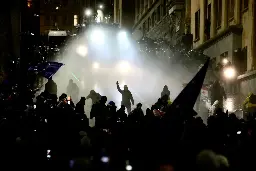
Nearly two thousand Georgian businesses have signed a petition calling for new elections, and more are expected to join as the political crisis fueled by Georgian Dream’s foreign policy U-turn and police repression continues to disrupt the economy.
Over 1,800 companies, including leading supermarket chains such as SPAR, local branches of Big Four accounting firms such as EY, PwC, and KPMG, communications and transport giants such as MagtiCom, and other top brands, are registered on the Free Business online platform. The platform was launched in December as discontent over Georgian Dream’s foreign policy moves and repression peaked.
[...]
Some companies have taken a different route to show solidarity with the ongoing protests. Georgia’s two major commercial banks, TBC Bank and the Bank of Georgia, announced on December 19 that they had jointly allocated GEL 5 million (USD 1.8 million) to support citizens and small and micro-businesses affected by the ongoing events.
[...]
The moves come as nationwide protests enter their fourth week and businesses, artists, and other citizens face financial disruptions, including numerous cancellations of Christmas/New Year’s events as the year draws to a close. Various solidarity funds have been set up to help those who have incurred damages due to the crisis.
These include a fund set up by ex-Prime Minister Nika Gilauri to support those injured or fined during protests and civil servants dismissed for political reasons. The University of Georgia has also set up a fund to support civil servants who quit or were fired because of their political views, and there is a strike fund run by the Gildia, the trade union for cultural and media workers, to help gig workers. Other initiatives, such as the fund run by journalist Nanuka Zhorzholiani, have been operating since the spring protests against the Foreign Agents Law.
[...]
It's all made from our data, anyway, so it should be ours to use as we want

Opinionated article by Alexander Hanff, a computer scientist and privacy technologist who helped develop Europe's GDPR (General Data Protection Regulation) and ePrivacy rules.
>We cannot allow Big Tech to continue to ignore our fundamental human rights. Had such an approach been taken 25 years ago in relation to privacy and data protection, arguably we would not have the situation we have to today, where some platforms routinely ignore their legal obligations at the detriment of society.
>Legislators did not understand the impact of weak laws or weak enforcement 25 years ago, but we have enough hindsight now to ensure we don’t make the same mistakes moving forward. The time to regulate unlawful AI training is now, and we must learn from mistakes past to ensure that we provide effective deterrents and consequences to such ubiquitous law breaking in the future.
Kennt jemand MelchOsint? Ich bin nicht auf Twitter und konnte das nicht verifizieren.
MelchOsint, a Twitter/X user, schreibt:
X, after reinstating the terrorists' profile, has deleted all posts before November 2024
They also deactivated search function on his profile, so you can only see his last 2 months posts.
Why ? Probably because it helps the "far-right/pro-israel" narrative that he is "not an ex-Muslim atheist, nor is he a fan of the AfD or Elon Musk"
There were 2016 posts proving the opposite, before Elon Musk deleted them.
Stimmt das?
<p>Serbia has been engulfed in protests for over six weeks as students and citizens demand accountability following the fatal collapse of a railway station canopy in Novi Sad, which claimed 15 lives on November 1. Demonstrators have accused President Aleksandar Vucic’s administration of corruption a...
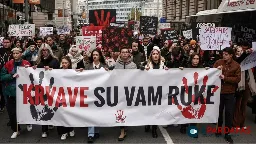
cross-posted from: https://beehaw.org/post/17711104
> Archived link > > Serbia has been engulfed in protests for over six weeks as students and citizens demand accountability following the fatal collapse of a railway station canopy in Novi Sad, which claimed 15 lives on November 1. Demonstrators have accused President Aleksandar Vucic’s administration of corruption and negligence, particularly in its dealings with Chinese contractors under Beijing’s Belt and Road Initiative (BRI). > > The tragedy has turned public attention toward the opaque contracts and alleged nepotism tied to infrastructure projects involving Chinese firms, further intensifying scrutiny of Serbia’s growing relationship with China. The incident is not only a domestic crisis but also a potential blemish on China’s ambitious BRI. > > Fatal Canopy Collapse Sparks Nationwide Protests > > The canopy collapse occurred during a renovation of the Novi Sad railway station, part of a Chinese-led project to modernize Serbia’s railway infrastructure. The project involved China Railway International Co. (CRIC) and China Communications Construction Co. (CCCC), both of which denied direct involvement in constructing the canopy. Despite these claims, footage on social media suggests the collapse was caused by recently installed heavy glass. > > [...] > > President Vucic dismissed the protests as being fueled by foreign intelligence agencies aiming to destabilize his government. However, under mounting pressure, he agreed to meet some of the protesters’ demands. Transparency Serbia, a watchdog organization, criticized the government’s response, highlighting gaps in the documentation released, including the absence of the 2018 contract signed with the Chinese firms. > > [...] > > The Novi Sad railway renovation forms part of a broader agreement between Serbia and China under the BRI. These BRI agreements often include confidentiality clauses, which critics argue shield corrupt practices. The contracts are rarely open to competitive bidding, enabling subcontracts to be awarded to firms linked to Serbia’s ruling party. > > While CRIC and CCCC maintain they did not directly construct the canopy, legal experts argue that as umbrella contractors, they are responsible for the performance of their subcontractors. This raises broader concerns about the quality and safety of BRI projects, particularly those involving local subcontractors. > > [...] > > Serbia’s strategic location as a bridge between Europe and Asia has made it a linchpin of Chinese President Xi Jinping’s flagship BRI. Chinese investments in Serbia have surged, with $6.4 billion in manufacturing foreign direct investments recorded in 2023 alone. In October, the two countries signed a free trade agreement, further cementing their economic ties. > > However, Western critics have long decried BRI projects for their lack of transparency and accountability. The Novi Sad disaster could amplify these criticisms, undermining China’s efforts to promote its infrastructure projects in Europe. > > [...]
<p>Serbia has been engulfed in protests for over six weeks as students and citizens demand accountability following the fatal collapse of a railway station canopy in Novi Sad, which claimed 15 lives on November 1. Demonstrators have accused President Aleksandar Vucic’s administration of corruption a...
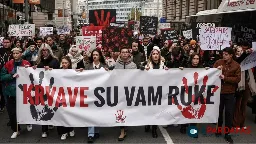
Serbia has been engulfed in protests for over six weeks as students and citizens demand accountability following the fatal collapse of a railway station canopy in Novi Sad, which claimed 15 lives on November 1. Demonstrators have accused President Aleksandar Vucic’s administration of corruption and negligence, particularly in its dealings with Chinese contractors under Beijing’s Belt and Road Initiative (BRI).
The tragedy has turned public attention toward the opaque contracts and alleged nepotism tied to infrastructure projects involving Chinese firms, further intensifying scrutiny of Serbia’s growing relationship with China. The incident is not only a domestic crisis but also a potential blemish on China’s ambitious BRI.
Fatal Canopy Collapse Sparks Nationwide Protests
The canopy collapse occurred during a renovation of the Novi Sad railway station, part of a Chinese-led project to modernize Serbia’s railway infrastructure. The project involved China Railway International Co. (CRIC) and China Communications Construction Co. (CCCC), both of which denied direct involvement in constructing the canopy. Despite these claims, footage on social media suggests the collapse was caused by recently installed heavy glass.
[...]
President Vucic dismissed the protests as being fueled by foreign intelligence agencies aiming to destabilize his government. However, under mounting pressure, he agreed to meet some of the protesters’ demands. Transparency Serbia, a watchdog organization, criticized the government’s response, highlighting gaps in the documentation released, including the absence of the 2018 contract signed with the Chinese firms.
[...]
The Novi Sad railway renovation forms part of a broader agreement between Serbia and China under the BRI. These BRI agreements often include confidentiality clauses, which critics argue shield corrupt practices. The contracts are rarely open to competitive bidding, enabling subcontracts to be awarded to firms linked to Serbia’s ruling party.
While CRIC and CCCC maintain they did not directly construct the canopy, legal experts argue that as umbrella contractors, they are responsible for the performance of their subcontractors. This raises broader concerns about the quality and safety of BRI projects, particularly those involving local subcontractors.
[...]
Serbia’s strategic location as a bridge between Europe and Asia has made it a linchpin of Chinese President Xi Jinping’s flagship BRI. Chinese investments in Serbia have surged, with $6.4 billion in manufacturing foreign direct investments recorded in 2023 alone. In October, the two countries signed a free trade agreement, further cementing their economic ties.
However, Western critics have long decried BRI projects for their lack of transparency and accountability. The Novi Sad disaster could amplify these criticisms, undermining China’s efforts to promote its infrastructure projects in Europe.
[...]
Through sources and footage, the BBC pieces together how China cracked down on the protests.
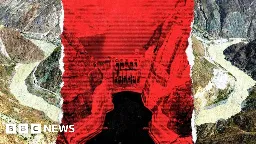
cross-posted from: https://beehaw.org/post/17710409
> Archived link > > Hundreds of Tibetans protesting against a Chinese dam were rounded up in a harsh crackdown earlier this year, with some beaten and seriously injured, the BBC has learnt from sources and verified footage. > > Such protests are extremely rare in Tibet, which China has tightly controlled since it annexed the region in the 1950s. That they still happened highlights China's controversial push to build dams in what has long been a sensitive area. > > Claims of the arrests and beatings began trickling out shortly after the events in February. In the following days authorities further tightened restrictions, making it difficult for anyone to verify the story, especially journalists who cannot freely travel to Tibet. > > But the BBC has spent months tracking down Tibetan sources whose family and friends were detained and beaten. BBC Verify has also examined satellite imagery and verified leaked videos which show mass protests and monks begging the authorities for mercy. > > The sources live outside of China and are not associated with activist groups. But they did not wish to be named for safety reasons. > > [...] > > The protests, followed by the crackdown, took place in a territory home to Tibetans in Sichuan province. For years, Chinese authorities have been planning to build the massive Gangtuo dam and hydropower plant, also known as Kamtok in Tibetan, in the valley straddling the Dege (Derge) and Jiangda (Jomda) counties. > > Once built, the dam's reservoir would submerge an area that is culturally and religiously significant to Tibetans, and home to several villages and ancient monasteries containing sacred relics. > > One of them, the 700-year-old Wangdui (Wontoe) Monastery, has particular historical value as its walls feature rare Buddhist murals. > > The Gangtuo dam would also displace thousands of Tibetans. The BBC has seen what appears to be a public tender document for the relocation of 4,287 residents to make way for the dam. > > [...] > > China is no stranger to controversy when it comes to dams. > > When the government constructed the world's biggest dam in the 90s - the Three Gorges on the Yangtze River - it saw protests and criticism over its handling of relocation and compensation for thousands of villagers. > > In more recent years, as China has accelerated its pivot from coal to clean energy sources, such moves have become especially sensitive in Tibetan territories. > > Beijing has been eyeing the steep valleys and mighty rivers here, in the rural west, to build mega-dams and hydropower stations that can sustain China's electricity-hungry eastern metropolises. President Xi Jinping has personally pushed for this, a policy called "xidiandongsong", or "sending western electricity eastwards". > > [...] > > The Chinese government has long been accused of violating Tibetans' rights. Activists say the dams are the latest example of Beijing's exploitation of Tibetans and their land. > > "What we are seeing is the accelerated destruction of Tibetan religious, cultural and linguistic heritage," said Tenzin Choekyi, a researcher with rights group Tibet Watch. "This is the 'high-quality development' and 'ecological civilisation' that the Chinese government is implementing in Tibet." > > One key issue is China's relocation policy that evicts Tibetans from their homes to make way for development - it is what drove the protests by villagers and monks living near the Gangtuo dam. More than 930,000 rural Tibetans are estimated to have been relocated since 2000, according to Human Rights Watch (HRW). > > [...] > > Multiple Tibetan rights groups [...] argue that any large-scale development in Tibetan territory, including dams such as Gangtuo, should be halted. > > They have staged protests overseas and called for an international moratorium, arguing that companies participating in such projects would be "allowing the Chinese government to profit from the occupation and oppression of Tibetans". > > [...]
Through sources and footage, the BBC pieces together how China cracked down on the protests.
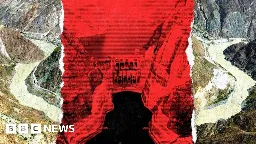
Hundreds of Tibetans protesting against a Chinese dam were rounded up in a harsh crackdown earlier this year, with some beaten and seriously injured, the BBC has learnt from sources and verified footage.
Such protests are extremely rare in Tibet, which China has tightly controlled since it annexed the region in the 1950s. That they still happened highlights China's controversial push to build dams in what has long been a sensitive area.
Claims of the arrests and beatings began trickling out shortly after the events in February. In the following days authorities further tightened restrictions, making it difficult for anyone to verify the story, especially journalists who cannot freely travel to Tibet.
But the BBC has spent months tracking down Tibetan sources whose family and friends were detained and beaten. BBC Verify has also examined satellite imagery and verified leaked videos which show mass protests and monks begging the authorities for mercy.
The sources live outside of China and are not associated with activist groups. But they did not wish to be named for safety reasons.
[...]
The protests, followed by the crackdown, took place in a territory home to Tibetans in Sichuan province. For years, Chinese authorities have been planning to build the massive Gangtuo dam and hydropower plant, also known as Kamtok in Tibetan, in the valley straddling the Dege (Derge) and Jiangda (Jomda) counties.
Once built, the dam's reservoir would submerge an area that is culturally and religiously significant to Tibetans, and home to several villages and ancient monasteries containing sacred relics.
One of them, the 700-year-old Wangdui (Wontoe) Monastery, has particular historical value as its walls feature rare Buddhist murals.
The Gangtuo dam would also displace thousands of Tibetans. The BBC has seen what appears to be a public tender document for the relocation of 4,287 residents to make way for the dam.
[...]
China is no stranger to controversy when it comes to dams.
When the government constructed the world's biggest dam in the 90s - the Three Gorges on the Yangtze River - it saw protests and criticism over its handling of relocation and compensation for thousands of villagers.
In more recent years, as China has accelerated its pivot from coal to clean energy sources, such moves have become especially sensitive in Tibetan territories.
Beijing has been eyeing the steep valleys and mighty rivers here, in the rural west, to build mega-dams and hydropower stations that can sustain China's electricity-hungry eastern metropolises. President Xi Jinping has personally pushed for this, a policy called "xidiandongsong", or "sending western electricity eastwards".
[...]
The Chinese government has long been accused of violating Tibetans' rights. Activists say the dams are the latest example of Beijing's exploitation of Tibetans and their land.
"What we are seeing is the accelerated destruction of Tibetan religious, cultural and linguistic heritage," said Tenzin Choekyi, a researcher with rights group Tibet Watch. "This is the 'high-quality development' and 'ecological civilisation' that the Chinese government is implementing in Tibet."
One key issue is China's relocation policy that evicts Tibetans from their homes to make way for development - it is what drove the protests by villagers and monks living near the Gangtuo dam. More than 930,000 rural Tibetans are estimated to have been relocated since 2000, according to Human Rights Watch (HRW).
[...]
Multiple Tibetan rights groups [...] argue that any large-scale development in Tibetan territory, including dams such as Gangtuo, should be halted.
They have staged protests overseas and called for an international moratorium, arguing that companies participating in such projects would be "allowing the Chinese government to profit from the occupation and oppression of Tibetans".
[...]
What else would they say?
A few days ago I posted an English summary of a German language article about Tiktok in Austria (see this post: https://beehaw.org/post/17463020). There seems to be a clear pattern how Tiktok's algorithm works, and it's not good for the users, let alone teenagers.
Es gibt auch in der ARD Mediathek was dazu:
Temu - Ramsch oder Revolution? -- [44 Minuten]
Die chinesische Online-Plattform "Temu" lockt mit extremen Billigangeboten. Wie steht es um die Qualität der Produkte? Die Doku deckt auf, wie "Temu"-Händler:innen gegen geltende Gesetze bei Zoll und Steuer verstoßen, besucht Stationen der Produktion und des Handels in China, trifft Schnäppchenjäger:innen in Deutschland und enthüllt Verkaufstricks. "Temu"-Produkte werden im Labor geprüft.
Temu hat mehr als 45 Millionen Nutzerinnen und Nutzer monatlich in Europa. Doch Lobbyarbeit gegenüber der Politik gibt die chinesische Handelsplattform bislang nicht an.

Temu hat mehr als 45 Millionen Nutzerinnen und Nutzer monatlich in Europa. Doch Lobbyarbeit gegenüber der Politik gibt die chinesische Handelsplattform nicht an. Obwohl der Konzern mittlerweile durch den Digital Services Act (DSA) der EU reguliert wird. Wie passt das zusammen?
Offenbar verfolgt der Techkonzern eine Strategie, die er bereits auf dem US-Markt erfolgreich angewandt hat: sich Politik, Behörden, Steuern und Regeln so lange wie möglich zu entziehen und dabei maximalen Profit herrauszuschlagen. Ziel von Temu ist es, die Präsenz in Europa auszubauen, Regeln spielen für den Tech-Konzern dabei keine Rolle.
[...]
Produziert werden die Produkte ausschließlich in China, die Endproduktion findet in der Regeln nahe bei Flughäfen statt, sodass die Produkte möglichst schnell um die Welt geflogen werden können. Die Qualität der angebotenen Produkte steht zunehmend in der Kritik durch Verbraucherschutzorganisationen. Die Verbraucherzentrale Bundesverband äußerte sich zunehmend besorgt über die Produktsicherheit bei Temu. Temu steht deswegen zu Recht in Europa und in Deutschland verstärkt in der Kritik.
[...]
Trotz seines Expansionskurs in Europa ist der Konzern schlecht erreichbar. Zunächst fällt auf, dass Temu weder Lobbybüros unterhält noch irgendwelche anderen Lobbytätigkeiten in Berlin und Brüssel in den jeweiligen Transparenzregistern angibt. Das gilt auch für den Mutterkonzern PDD Holdings und den an der Holding mit 15 Prozent beteiligten Tencent Konzern aus China. Tencent macht zwar Angaben in den Lobbyregistern in Berlin und Brüssel. Nichts deutet jedoch darauf hin, dass der Konzern neben seinem eigenen Geschäft auch für Temu Lobbyarbeit betreibt. Auch die Firma Whaleco Technology Limited, unter der Temu in Europa angemeldet ist, weist keine Lobbyarbeit in der EU auf. Auf mehrfache Anfrage zu Aktivitäten in Deutschland von LobbyControl reagierte Temu bedauerlicherweise nicht.
[...]
Eine brisante Spur führt jedoch nach Irland. In Irlands Haupstadt Dublin sitzt Whaleco, das eben erwähnte Unternehmen, das hinter Temu in Europa steckt. Der Firmensitz ist kein Zufall. Im Niedrigsteuerland Irland zahlt der Konzern nur halb so viele Steuern wie in Deutschland, wo die Plattform aber eigentlich deutlich mehr Produkte absetzt. Auch die meisten großen US-Techkonzerne, wie Meta oder Apple, machen sich das EU-Steuerparadies zunutze und haben deshalb ihren europäischen Sitz in Irland.
[...]
Temus Dreistigkeit braucht Grenzen
Es zeichnet sich bei Temu ein Muster ab: Der Konzern entzieht sich Behörden und Politik so weit und so lange er kann. Durch die Abwesenheit an Lobbyist:innen in Berlin, Brüssel und Dublin, gibt es keine unmittelbaren Ansprechpartner vor Ort für die Politik. Durch den Firmensitz in Irland, der nur aus einem kleinen Büro besteht, ist selbst dort nur ein eingeschränkter Kontakt möglich. Und durch den Cargotransport mit dem Flugzeug gelingt es Temu oft die Zollbehörden zu umgehen.
Der Fall Temu macht deutlich, dass Europa ein Problem mit der Durchsetzung seiner Gesetze hat. Weder die Qualität der Waren noch die Zollkontrollen hat Brüssel bei dem chinesischen Techkonzern im Griff – mit negativen Folgen für Verbraucher:innen und europäische Unternehmen, die sich selbst an Regeln halten und unter dem Preisdruck von Temu leiden. Temu kann mit Billigwaren von teilweise zweifelhafter Qualität den europäischen Markt überfluten.
[...]
Die etablierten Parteien haben eine Brandmauer zur AfD hochgezogen. Wann aber kommt die Brandmauer zu TikTok? Die Plattform geht kaum gegen Falschinformationen und Hetze vor. Integre Nutzende werden daher stets im Hintertreffen bleiben, schreibt unser Gastautor.

Mit ihrem alternativen Verhältnis zu Wahrheit, Toleranz und Humanität fährt die AfD Wahlerfolge ein. Ihr Klientel nutzt kaum noch klassische Medien zur Information, sondern Social Media. Dank deren Algorithmen verbreiten sich Falschinformationen und Hetze in Filterblasen und setzen sich fest. Facebook, X oder Telegram machen es vor. TikTok aber ist der Meister der Skrupellosigkeit. In der Europäischen Union nutzen 142 Millionen Menschen TikTok, also fast jeder Dritte.
Die russische und die chinesische Regierung nehmen mit Desinformationstruppen Einfluss auf das, was auf TikTok ausgesendet und konsumiert wird. TikTok wird von Extremisten zur Verbreitung ihres Gedankenguts verwendet und trägt so zur Radikalisierung der politischen Debatte bei. Diese Form der Kommunikation ist ein großes Risiko für unsere Demokratie.
[...]
Etablierte Politiker als schlechte Vorbilder
Um TikTok nicht den Rechten zu überlassen, meinen Politiker, mit ihrer dortigen Präsenz der AfD und deren Propaganda etwas entgegensetzen zu können. Gesundheitsminister Karl Lauterbach machte den Anfang. Bundeskanzler Olaf Scholz und seine Aktentasche folgten (@TeamBundeskanzler). Selbst Robert Habeck und seine Grünen wollen über TikTok einen Meinungswandel herbeiführen.
Habeck auf TikTok verblüfft besonders, hatte er doch 2019 Twitter und Facebook vorläufig wegen Hass, Falschinformationen und unsicherer Datenverarbeitung verlassen. Inzwischen ist es auch dorthin zurückgekehrt.
Deutsche Sicherheitsbehörden, insbesondere die Verfassungsschutzämter, sehen diese Aktivitäten kritisch, ebenso die Datenschutzbehörden. Bußgelder auf europäischer Ebene gegen TikTok haben offenbar keinen Einfluss auf die Nutzung in Deutschland. TikTok behauptet fälschlich, sich an die europäische Datenschutz-Grundverordnung (DSGVO) zu halten. Die Regeln zum Kinderschutz werden nicht beachtet. Valide Rechtsgrundlagen für die Verarbeitung bestehen nicht. Weder die uninformierten Einwilligungen noch Vertragskonstrukte, geschweige denn ein „berechtigtes Interesse“ können die Verarbeitung durch TikTok legitimieren. Schon gar nicht die Verarbeitung sensitiver Daten, etwa in Bezug auf politische Meinungen.
[...]
Das Verbot politischer Werbung, zu dem sich TikTok selbst bekennt, wird regelmäßig missachtet. Von „Privacy by Design“ und „Privacy by Default“ kann keine Rede sein. Bei Sicherheitsfeatures wie etwa der Kennzeichnung von Videos mit drastischen Bildern, gefährlichen Stunts und KI-generiertem Inhalt bestehen Defizite. Filteroptionen für unerwünschte oder schädliche Inhalte fehlen.
[...]
Meinungsfreiheit ist kein Gegenargument. Äußerungen auf einer platten Plattform wie TikTok sind zweifellos grundrechtlich geschützt. Das entbindet aber Medium und Autoren nicht davon, die allgemeinen Gesetze zu beachten. Was für Lokalzeitungen, Spiegel, ARD oder RTL gilt, gilt auch für Social Media generell und TikTok speziell. Es gibt keine Regel, wonach die Reichweite eines Mediums dessen Zulässigkeit bestimmt.
[...]
Oasis Security's research team uncovered a critical vulnerability in Microsoft's Multi-Factor Authentication (MFA) implementation, allowing attackers to bypass it and gain unauthorized access to the user’s account, including Outlook emails, OneDrive files, Teams chats, Azure Cloud, and more. Microso...
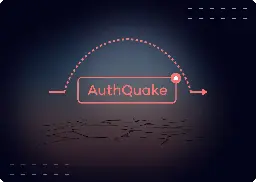
Here is the report (pdf) -- (archived)
Oasis Security's research team uncovered a critical vulnerability in Microsoft's Multi-Factor Authentication (MFA) implementation, allowing attackers to bypass it and gain unauthorized access to the user’s account, including Outlook emails, OneDrive files, Teams chats, Azure Cloud, and more. Microsoft has more than 400 million paid Office 365 seats, making the consequences of this vulnerability far-reaching.
The bypass was simple: it took around an hour to execute, required no user interaction and did not generate any notification or provide the account holder with any indication of trouble.
[Edit to insert the original link to the Oasis site.]
What would be the alternative? One consequence of the so-called 'multi-polar world' will be a limited flow of capital between different blocs, limited cross-border investments across multiple industries, which might lead to market fragmentation and a divergence of technical standards. We could see degrees of globalization we had back in the 1990s.
Countries like Russia don't seem to care about international law (or they care only if it is in their favor). This summer, some officials also discussed the seizure of China-owned infrastructure in Europe regarding Beijing's support for Russia in its war against Ukraine. Russia and its allies will remain a threat to democracy which is their only real enemy. Russia won't stop with Ukraine if they get what they want.
So, what's the alternative?
The European Union is assessing the legal and financial implications of confiscating Russia’s sanctioned central bank assets for use by Ukraine, according to people familiar with the matter.

The bloc’s diplomatic service, as well as some member states, are examining whether judicial decisions would be needed as a legal basis to seize the frozen assets, or if a damage calculation would be enough, said the people, who asked for anonymity to discuss the sensitive issue.
[...]
A decision to confiscate the money and hand it over to Ukraine would be a significant departure from the current approach. [...] Up to now, the EU and the Group of Seven nations have tapped the profits generated by some $300 billion in sanctioned Russian assets to provide aid to Ukraine. Under a G-7 plan, Kyiv’s allies approved a mechanism where the profits would be used to underpin a €50 billion ($52.5 billion) loan package for Kyiv.
[Confiscation of foreign assets, let alone of that size, would be unprecedented in history. While central bank reserves have been frozen many times -e.g., the United States are still holding the reserves of Iraq and Afghanistan, yet technically they remain the property of these countries. Central bank reserves of another country have never been confiscated before.]
[...]
Some EU member states are currently evaluating what effect such a move would have on the euro as a currency, the people said. They’re also assessing the potential impact of third countries deciding to withdraw assets from countries that proceed with seizures.
[...]
Kaja Kallas, the EU’s new foreign policy chief who runs its diplomatic service, said during her confirmation hearing last month that frozen assets should be tapped directly. “I will not use the word confiscation, because it’s really using the assets in a legal way,” she said.
[...]
Ever wonder where all those high officials in China keep disappearing to?Here’s the answer… and the increasingly frequent headlines on yet another Party boss gone missing don’t even begin to cut it.
cross-posted from: https://beehaw.org/post/17662074
> Ever wonder where all those high officials in China keep disappearing to? > > They are but few of a whopping 26,000 individuals placed into the Chinese Communist Party’s notorious Liuzhi system in 2023 alone. Liuzhi, or retention in custody, is a special “investigative mechanism” that allows the [Chinese Communist] Party’s [CCP] internal police force (Central Commission for Discipline Inspection – CCDI) to forcefully disappear, arbitrarily detain and torture individuals for up to six months. All without any judicial oversight or appeal mechanism, the system is specifically designed to force confessions from the victims. > > As former CCDI lead Liu Jianchao (since promoted to head of the International Liaison Department) put it: “These are not criminal or judicial arrests and they are more effective”. > > A successor to Shuanggui, the system is another of the many hardening reforms since Xi Jinping assumed the helm of the CCP and rapidly started moving the country even further away from the most basic human rights standards to which it is beholden under international law. > > [...] > > Officially instituted under the National Supervision Law in 2018, liuzhi is rapidly catching up with other mechanisms of enforced disappearances in the People’s Republic of China (PRC). Its use now appears to be on par with the use of Residential Surveillance at a Designated Location (RSDL), instituted in 2014 and most often employed against human rights defenders. > > [...] > > Per regulation, any individual placed inside the system must be held in solitary confinement. The vast majority of victims are kept from any type of communication with the outside world and their family members are not informed of their whereabouts (or even the retention itself) as the system makes use of undisclosed (designated) locations, from custom-built facilities to CCP-run hotels, guesthouses, offices, etc. By any definition, it is a system of Party-state sanctioned incommunicado detention. > > [...] > > The reasoning behind it all is very simple: to break the victims down. As a Professor at Peking University explained: [These cases are] “heavily dependent on the suspect’s confession. (...) If he (the suspect) remains silent under the advice of a lawyer, it would be very hard to crack the case”. > > Testimonies from inside liuzhi (or its predecessor shuanggui) are rare, but all agree: "It looks very nice. But it is the worst place in the world." - Jean Zou, a shuanggui victim. > > >“The rooms mostly looked normal, with all the expected facilities — bathroom, tables, sofa, she said in an interview. The only sign of the room’s true purpose was the soft rubber walls. They were installed because too many officials had previously tried to commit suicide by banging their heads against the wall” – description of a facility in Shanghai by Lin Zhe, professor at the Central Party School. > > [...] > > In January 2024, for the first time since the system’s formal inauguration, the CCDI published official data on its use: no less than 26,000 individuals had been placed inside the system in 2023 alone! > > That is an average of 71 people being forcefully disappeared, arbitrarily detained and subjected to torture in liuzhi alone… Every. Single. Day. > > The scary part: the 2023 number corresponds exactly to the worst-case high estimates [the rights group] Safeguard Defenders had made for previous years, based on partially available data from provincial Discipline Inspection Committees and punishment statistics. > > [...]
Ever wonder where all those high officials in China keep disappearing to?Here’s the answer… and the increasingly frequent headlines on yet another Party boss gone missing don’t even begin to cut it.
Ever wonder where all those high officials in China keep disappearing to?
They are but few of a whopping 26,000 individuals placed into the Chinese Communist Party’s notorious Liuzhi system in 2023 alone. Liuzhi, or retention in custody, is a special “investigative mechanism” that allows the [Chinese Communist] Party’s [CCP] internal police force (Central Commission for Discipline Inspection – CCDI) to forcefully disappear, arbitrarily detain and torture individuals for up to six months. All without any judicial oversight or appeal mechanism, the system is specifically designed to force confessions from the victims.
As former CCDI lead Liu Jianchao (since promoted to head of the International Liaison Department) put it: “These are not criminal or judicial arrests and they are more effective”.
A successor to Shuanggui, the system is another of the many hardening reforms since Xi Jinping assumed the helm of the CCP and rapidly started moving the country even further away from the most basic human rights standards to which it is beholden under international law.
[...]
Officially instituted under the National Supervision Law in 2018, liuzhi is rapidly catching up with other mechanisms of enforced disappearances in the People’s Republic of China (PRC). Its use now appears to be on par with the use of Residential Surveillance at a Designated Location (RSDL), instituted in 2014 and most often employed against human rights defenders.
[...]
Per regulation, any individual placed inside the system must be held in solitary confinement. The vast majority of victims are kept from any type of communication with the outside world and their family members are not informed of their whereabouts (or even the retention itself) as the system makes use of undisclosed (designated) locations, from custom-built facilities to CCP-run hotels, guesthouses, offices, etc. By any definition, it is a system of Party-state sanctioned incommunicado detention.
[...]
The reasoning behind it all is very simple: to break the victims down. As a Professor at Peking University explained: [These cases are] “heavily dependent on the suspect’s confession. (...) If he (the suspect) remains silent under the advice of a lawyer, it would be very hard to crack the case”.
Testimonies from inside liuzhi (or its predecessor shuanggui) are rare, but all agree: "It looks very nice. But it is the worst place in the world." - Jean Zou, a shuanggui victim.
>“The rooms mostly looked normal, with all the expected facilities — bathroom, tables, sofa, she said in an interview. The only sign of the room’s true purpose was the soft rubber walls. They were installed because too many officials had previously tried to commit suicide by banging their heads against the wall” – description of a facility in Shanghai by Lin Zhe, professor at the Central Party School.
[...]
In January 2024, for the first time since the system’s formal inauguration, the CCDI published official data on its use: no less than 26,000 individuals had been placed inside the system in 2023 alone!
That is an average of 71 people being forcefully disappeared, arbitrarily detained and subjected to torture in liuzhi alone… Every. Single. Day.
The scary part: the 2023 number corresponds exactly to the worst-case high estimates [the rights group] Safeguard Defenders had made for previous years, based on partially available data from provincial Discipline Inspection Committees and punishment statistics.
[...]
No, Chomsky and Herman don't apply here, It was Russia that started the war. The aggressor is Putin's Russia. The "manufactured consent" -if at all- works here only with the tankies and other derailed communities.
[Edit typo.]
The Russian economy is going to face a very bad long-term future, even if the war ended today and all sanctions were lifted.
How Russia prepares children in occupied Ukraine to fight against their own country
Russia is using a militaristic youth organization, Yunarmia, to foster the loyalty of teenagers in occupied parts of Ukraine and prepare them to fight in Moscow's war against their native country [...]
Russia opened the first Yunarmia branch in the occupied territories of Ukraine in Crimea months after the organisation's official formation. By September 2016, Yunarmia had spread across the Black Sea peninsula, according to Oleh Okhredko, an analyst at the Almenda Center Of Civic Education, a Ukrainian group whose activities include documenting violations of the rights of children in wartime [...]
In 2014, Russia occupied Crimea and fomented war in the Donetsk and Luhansk regions in eastern Ukraine – the Donbas [...]
Yunarmia "was created with the specific idea of the militarised reeducation of not only Russian [children] but also Ukrainian children from the occupied territories," said Kateryna Rashevska, a lawyer at the Regional Center for Human Rights, which was forced to move from Crimea to Kyiv after the Russian occupation.
By January 2022, a month before Russia's full-scale invasion of Ukraine, Yunarmia had 29,000 members in Crimea alone, according to the Russian Defence Ministry [...]
Zweitens ändert das ja nichts, ob die Solaranlagen da aus deutscher oder chinesischer Produktion kommen.
Es hilft wirklich, wenn man auch mal was liest, als laufend das eigene Narrativ zu bedienen. Was Du da verbreitest, ist ein kompletter Mumpiz.
This is a good question. There's is no reason why this -and a lot of other things imho- must be connected.
Hacking Rooftop Solar Is a Way to Break Europe’s Power Grid
[...] The average number of weekly cyberattacks on utilities worldwide doubled within two years to about 1,100 [...] “There’s some naivete about the risk,” Harry Krejsa, director of studies at the Carnegie Mellon Institute for Strategy & Technology in Pittsburgh, told the Columbia Energy Exchange podcast last week. “It should be more of a concern than is widely perceived today.”
[...] the scenario comes amid wars in Ukraine and the Middle East, and the West’s fracturing relationships with Russia and China. The latter is the biggest maker of solar panels.
Sogar die chinesische Regierung macht sich offiziell Sorgen um die Überkapazitäten des Landes, nd aus eben diesem Grund wollen chinesische Firmen auch dieses Kartell nach dem Vorbild des Opec. Quellen dazu findet man leicht, und zwar auch dazu, dass der Stromnetzausbau in China weit hinterher hinkt.
Ein Beispiel hier (auf Englisch):
China's Solar Industry Faces Overcapacity Crisis
China's solar industry is grappling with severe overcapacity, leading to a sharp decline in new projects and a wave of bankruptcies. In the first half of the year, the number of new solar manufacturing projects fell by over 75%, according to the China Photovoltaic Industry Association (CPIA), with more than 20 projects canceled or suspended.
The canceled projects represent significant losses in production capacity, including over 300,000 metric tons of polysilicon and more than 60 gigawatts of solar cell capacity. Many factories are operating at only 50-60% capacity, and at least six companies have partially suspended operations domestically, with two halting production abroad. The glut in the market has driven solar panel prices below production costs, pressuring profit margins. Experts predict prices may not recover until the end of 2024.
Du findest viele andere Beispiele im Netz.
Und in Deutschland und Europa müssen wir Firmen wie Meyer Burger und all die anderen besser auslasten. Die Firmen gibt es.
Es wäre nicht sehr sinnvoll, die Abhängigkeit von fossilen Brennstoffen aus Russland durch Abhänigkeit von chinesischer Solartechnologie ersetzen. Das sollte klar sein.
Amazon is donating $1 million to Trump’s inauguration
Bezos and the company decided on the contribution earlier this week, and communicated it to Trump’s team, according to some of the people. “Bezos is donating through Amazon,” according to a person close to Bezos. Amazon also will stream the inauguration through its Prime Video business, a separate, in-kind donation valued at $1 million, another of the people said.
Seems to be sort of a flat rate.
